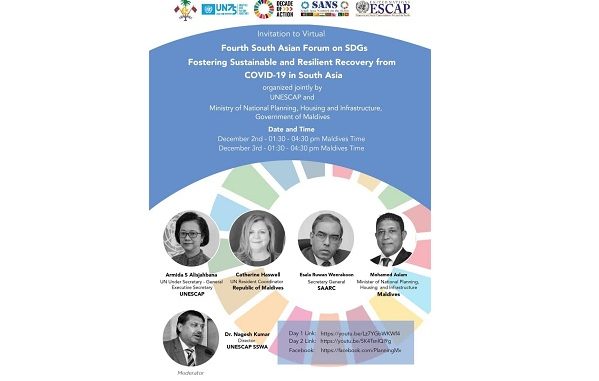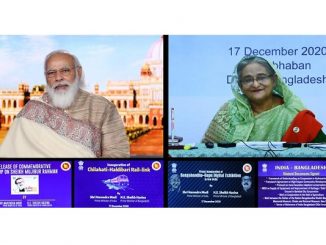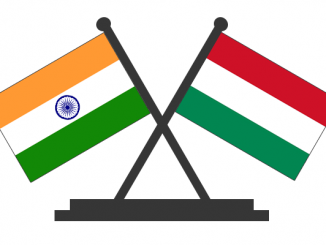
Dec 4: In the backdrop of the 4th South Asian Forum of Sustainable Development Goal (SDG), UNESCAP South Asia and Pacific virtually organized a special dialogue on disaster and climate resilience in South Asia today. The key objectives of the High-Level meeting were to identify the opportunities and imperatives to overcome the challenges in implementing the systemic approach to disaster and public health risk management. In addition, other objectives were to formulate the strategies for capitalizing on existing regional and sub-regional cooperation mechanisms including the South Asian Forum on SDG to scale up multi-hazard and multi-sectoral preparedness systems for future cascading disasters.
Minister of State for Home Affairs Shri Nityanand Rai addressed the gathering. The other panelists were Mr. Qasim Haidari, Deputy Minister, Islamic Republic of Afghanistan; Md. Enamor Rahman, State Minister, Bangladesh; Ms. Khadeeja Naseem, Deputy Minister, Maldives; Mr. Malik Amin Aslam Khan, Adviser to the Prime Minister on Climate Change, Government of Pakistan. Opening remarks were given by Ms. Armida Salsiah Alisjahbana, United Nations Under-Secretary-General and Executive Secretary of ESCAP.
In his speech, the Minister of State for Home Affairs, Shri Nityanand Rai highlighted that South Asian nations are facing challenges of extreme weather events like floods, cyclones, heat waves, cold waves, landslides, and drought as well as the COVID-19 pandemic and its recovery. Public health issues are posing an additional challenge to all countries of South Asia. For such situations, we need to have a strong collaborative framework for cooperation. He further said that Prime Minister Shri Narendra Modi’s vision for eliminating single-use plastics; expansion of forest cover, improvement, and restoration of 26 million hectares of degraded land by 2030 have already started yielding positive results and India is encouraging a circular economy.
Shri Rai also said that the Prime Minister of India took the initiative for the coalition for resilient infrastructure and announced the global Coalition for Disaster Resilient Infrastructure (CDRI), at the UN Climate Action Summit 2019 held in New York City on 23 September 2019.
He further mentioned that India is also hosting the SAARC Disaster Management Centre, which works closely with the Universities of SAARC and BIMSTEC member States. The prevailing COVID-19 situation is further increasing the vulnerabilities of the region in an exponential manner. Therefore, it is the duty of all of us in the region to not only reduce our own disaster risks but also to promote regional cooperation and mutual help, before, during, and after disasters.
Shri Rai affirmed India’s commitment to regional cooperation in making South Asia a resilient region and peaceful place to live. He also congratulated NIDM and ESCAP regional office for holding a joint workshop on managing cascading disaster risk with SAARC and BIMSTEC in September-October 2020.
Disclaimer: We donot claim that the images used as part of the news published are always owned by us. From time to time, we use images sourced as part of news or any related images or representations. Kindly take a look at our image usage policy on how we select the image that are used as part of the news.


